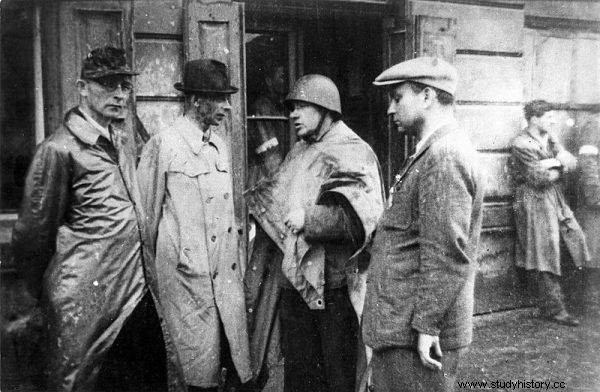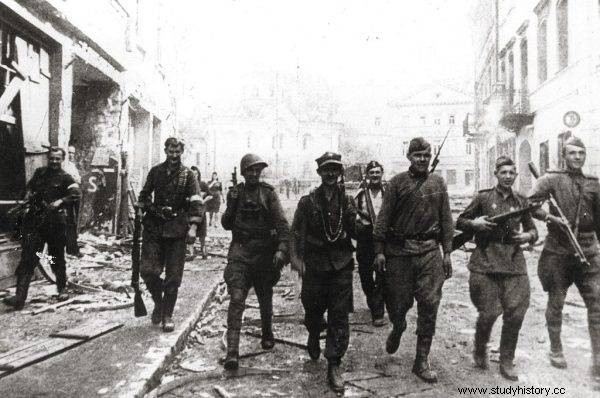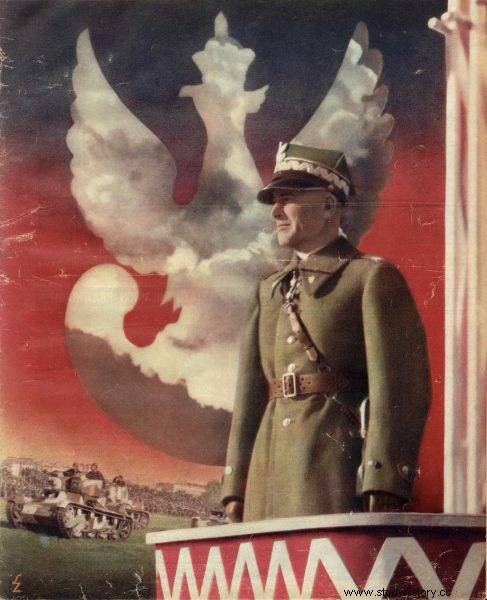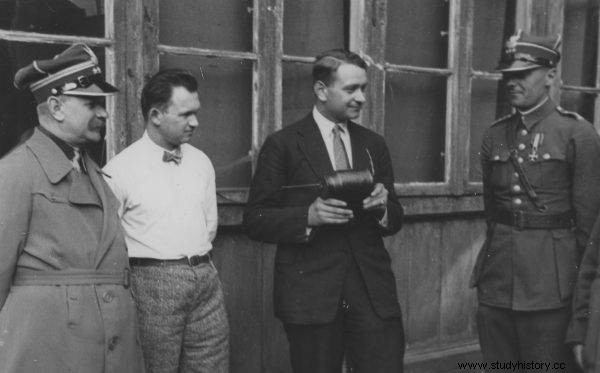Stefan Witkowski's musketeers were one of the most effective and mysterious Polish underground organizations during World War II.
The last fights in the 1939 war campaign took place under the command of General Franciszek Kleeberg in the Kock region. This excellent commander, realizing that Poland had lost the campaign, in the course of preparations of his troops for formal surrender on October 5, he called Reserve Lieutenant Stefan Witkowski and, in the presence of Colonel Epler, entrusted him with the task of creating a secret resistance organization that could continue the fight against the Germans and the Soviets.
This is how the creation of the Musketeers organization was inspired . From the beginning, Witkowski decided to concentrate his efforts on the interview. The organization was divided into many departments:military intelligence, sabotage techniques, finance, document counterfeiting, etc.
At the beginning, four people headed the network:engineer Stefan Witkowski (pseudonym Stewit) - the soul and leader of this organization, Colonel Jan Jastrzębski (pseudonym Ptaszek) - Witkowski's first deputy, engineer Stefan Dembiński (pseudonym Antoni) - responsible for counterintelligence and Aleksander Wielopolski secretariat and political information gathering.
Polish Musketeers
Soon the organization grew. Many great and talented officers joined her. Immediately after arriving at that "Salvation", we met Colonel Tadeusz Komorowski-Bor - later general, commander of the Home Army and the Warsaw Uprising, the aforementioned cousin of my mother, Lieutenant Colonel Klemens Rudnicki - soon a prisoner of the NKVD, and then one of the commanders of Polish military units in the West, promoted to the rank of general for the Italian campaign of 1944, Colonel Edward Godlewski - former commander of the 14th Uhlan Regiment in Lviv , experienced officer Karol Anders, brother of the famous general, Captain Michał Gutowski and many, many others.

Immediately after arriving at that "Salvation" we met Colonel Tadeusz Komorowski-Bor
They were not only military. All Rena's friends gave the Musketeers advice, help and support, and participated in their extensive activities . Count Ludwik Plater-Zyberk - my sister Beby's future husband - played an important role there. His cousin Stefan was involved in making copies and microfilms with intelligence reports for the Polish authorities rebuilding regular units of the Polish army in France.
Klementyna Mańkowska - countess spy
First, we got to know the underground activities of Ludwik and Beby. They were to organize and facilitate the escape of Polish officers who were still in German transit camps and hospitals. They laughed often at their adventures. However, I quickly realized that what they were doing deserved the name of feats that required real courage, great composure, and that they were simply risking their lives . This couple never ran out of ideas, initiative and audacity. Listening to their stories, I was eager to do the same (…).
Stewit has already notified London of the possibility of sending me to Great Britain as an agent of the Abwehr . They agreed that upon my arrival in London I would be arrested immediately in some public place on the charge of collaboration with the enemy. The news of this arrest, without giving his name, will be broadcast the same day as a Reuters cable on the BBC radio news at 10pm. It will be a signal for both Stewit and the Germans.

The text is a fragment of the sensational memories of Klementyna Mańkowska, a Polish aristocrat, one of the best Allied agents of World War II. The book "My mission of war" has just been released by the Rebis publishing house.
After discussing the matter, we turned to the reports. His materials on Germany, Russia and Poland were ready. Mine about France still needed to be reviewed, corrected and encrypted before microfilming (...).
Musketeers vs. Union of Armed Struggle
Now, Stewit continued, let's move on to the oral instructions. Remember everything I say to you. It is very important. In London, you'll be dealing with Intelligence Service officers right away. Please contact Rohn and he will explain our situation to him. It is not the best because of the struggle for influence and power.
ZWZ, a strictly military organization, very useful by the way, is not as competent in the field of intelligence. People from the AGM want to have a monopoly on all information and forward them to London themselves. They blame me for keeping in direct contact with the English, our main allies. They demand full submission from me, which I cannot accept at any cost.

ZWZ, a strictly military organization, very useful, by the way, is not as competent in the field of intelligence (illustrative photo).
The mesh I created can only work as top secret and be completely independent . It would be a great mistake to agree to be linked to the AGM. We must act on the model of the Carpathian Brigade in Tobruk, which reports directly only to the English command. Unfortunately, our government in London, probably under the influence of the AGM reports, does not want to let this happen and wants to force us to submit. Therefore, the AGM takes away our supplies . Our radio is barely jerking, and I don't have the money to pay for repairs and maintenance.
I will give you our two ten-dollar coins for contact with me. You will give one to Rohn, the other to whomever you deem useful. We'll talk about some other important things tomorrow. Meeting in "Zbawienie" at 2 p.m. You cannot write anything down, but please remember everything carefully.
Śmigły-Rydz's special mission
On Monday, November 24, Stewit was waiting for me. After exchanging a few words with Rena, he started with a very serious face:
- What I am going to tell you today is very important, absolutely top secret . Marshal Śmigły-Rydz, who in September 1939 decided to leave Poland and go to Romania, counted on the reorganization of the Polish armed forces in this allied territory and an attack on the Germans from this flank. Unfortunately, the Romanians betrayed him and, together with the staff and the troops that followed him, interned him in the camp . It would take too long to talk about what happened next. We don't have time for this.

Marshal Śmigły-Rydz, who in September 1939 decided to leave Poland and go to Romania, counted on the reorganization of the Polish armed forces
In short, the marshal, weary, exhausted from the long walk, returned to Warsaw, wanting only one thing:to serve his homeland as best he could . He contacted the AGM, which rejected cooperation with him, although he did not demand recognition of his rank or his command. They just didn't want him! Then he turned to us. First of all, he wants to take an oath of allegiance to General Sikorski, our supreme leader in London, submitting himself completely to his orders like a simple soldier. We will go to him, and he will provide you with a personal letter, which should be handed over to General Sikorski in person (...).
Split in the Resistance
Witkowski asked me to get a meeting with General Sikorski, so that I would present him the increasingly difficult situation of the Musketeers and their boss. General Rowecki demands the total subordination of the Musketeers to the Union of Armed Struggle, which is unacceptable to Witkowski. He says that his intelligence work must be secret and beyond the interference of any other organization . He has agents in all the occupied countries, especially in Germany. His job is being made difficult by limiting credits (…).

Engineer Stefan Witkowski (first from the right) - pseudonym Stewit - soul and leader of the Musketeers
But why this war with Stewit? (...) The English spoke only well of him. He is a great patriot, remarkably intelligent, with initiative and proven courage. We know that he works directly with the English. So what? After all, we are not the ones playing the key role in this war. Helping the English means helping the common cause (…).
With Colonel Protasewicz, with Colonel Mitkiewicz, with Captain Messinger and many others whose names I don't remember anymore. The same questions about the Musketeers, their antipathy. In light of these questions, the real war seemed to no longer exist for them, and our main problem was to be Stewit.
Source:
The text is a fragment of the sensational memories of Klementyna Mańkowska, a Polish aristocrat, one of the best Allied agents of World War II. The book "My mission of war" has just been released by the Rebis publishing house.

